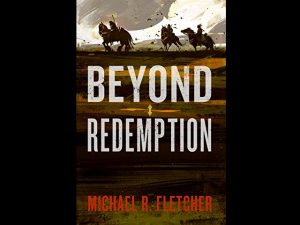

I interviewed Michael R. Fletcher earlier last year, when he first gave me a review copy of Beyond Redemption, the first book of his Manifest Delusions series. The interview was a good idea for me to get to know him as an author and to help promote his work before finishing his novel, which I knew would take some time. Although I already had the review copy, what I read was good enough for me to buy a copy later on.
A few weeks ago, though I had started the Beyond Redemption work first, I was able to read Fire and Flesh, which served as a great introduction into the world of Manifest Delusions. Fire and Flesh was a short read that was also entertaining, and I’m glad I finished it before finishing the novel, since it complimented Beyond Redemption so well. I wrote a review for the work which is also here on Comicbooked.

The story behind Beyond Redemption is pretty interesting. Delusions grant special abilities to powerful people. A theocrat raises a gifted child in the hopes that the child will become a God, a deity who will be under his control. Why worship a God when a God can worship you and do whatever you wnat, right?
As the theocrat works towards his goal, three adventurers hear of this special future deity, and see an opportunity to reach their own selfish goals…
In reading Michael R. Fletcher’s work, I was first impressed with how hard he worked to create something new. Fletcher was successful in being innovative with this epic series he’s created. He took German words and terminology in a creative way (as he’s not a native or fluent German speaker, he did take a lot of artistic license in the task!) to describe characters, places, and settings in his Beyond Redemption novel. The innovation doesn’t end there: Michael R. Fletcher used psychology, and different neurological/pathological disorders in his world building as well. I jokingly told him his work made me want to study the DSM-V, and he admitted to spending a lot of time researching this psychology manual, in order to make realistically demented and delusional characters.
The research paid off.
There are powerful people in this novel with a variety of abilities. Through delusion, there are those who can use doppels, basically neurotic copies of themselves that assume some specific aspect of their personality/psychology and do tasks for their creator. There are Hassebrands, who can conjure fire with mere thought and desire. There are Mirrorists, who can communicate to reflections and gain truths others can’t, and powerful seducers who can play on people’s emotions in a cult leader fashion, making them do the unspeakable.
















